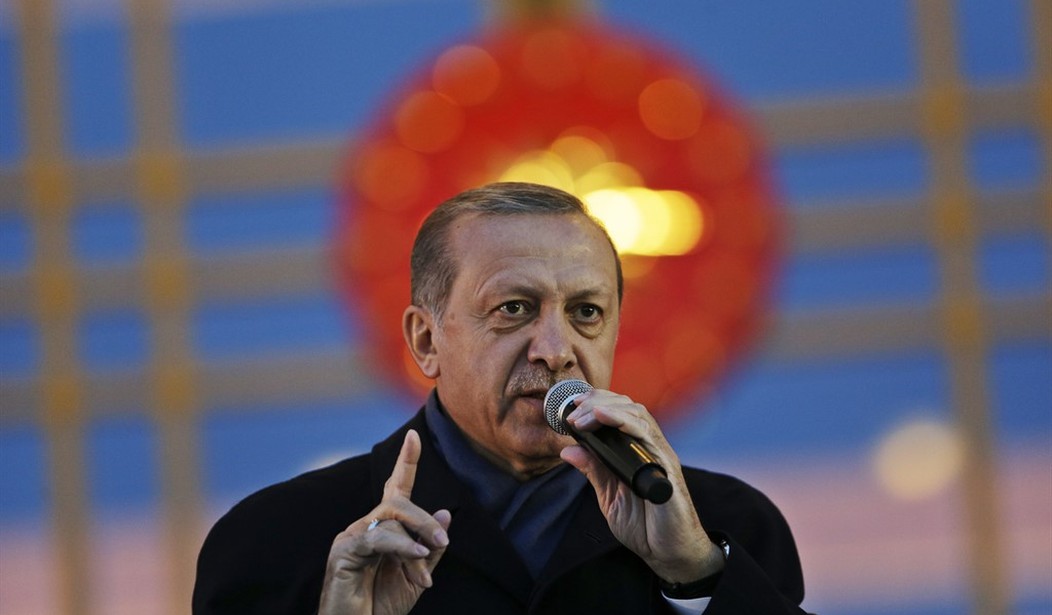I can understand why Trump might choose to congratulate him privately, as repulsive as it is to think of the president back-slapping a foreign leader on assuming dictatorial power. Foreign policy is a game of hardball and Turkey’s cooperation is useful to the United States in various ways. If preserving that cooperation requires making nice with the new caliph, that’s a tough but defensible calculation.
I can’t understand admitting publicly that you’ve congratulated him, though, especially when credible accusations of cheating by Erdogan’s allies are swirling. From the White House readout:
President Donald J. Trump spoke today with President Recep Tayyip Erdogan of Turkey to congratulate him on his recent referendum victory and to discuss the United States’ action in response to the Syrian regime’s use of chemical weapons on April 4th. President Trump thanked President Erdogan for supporting this action by the United States, and the leaders agreed on the importance of holding Syrian President Bashar al-Assad accountable. President Trump and President Erdogan also discussed the counter-ISIS campaign and the need to cooperate against all groups that use terrorism to achieve their ends.
All they had to say was that Trump called Erdogan to “discuss” the referendum. If some reporter asked Trump later whether he offered congratulations or not, Trump could have declined to answer on grounds that conversations with foreign leaders are confidential. That, at least, would have denied Erdogan any public legitimacy from the U.S. for his power grab. Instead the White House seems to be not only endorsing the outcome but effectively legitimizing the referendum itself, as you wouldn’t congratulate someone on an electoral victory if you had doubts about whether they won fair and square. In their own statements, the French and German governments each emphasized how evenly divided Turkish voters were on handing supreme power to Erdogan, with the French stressing that they would “follow with great care” the investigation into possible election fraud. The White House statement says nothing about Turkish divisions, about the allegations of cheating, or about the fact that the head of a NATO country — an Islamist, no less — just pivoted his country from democracy to dictatorship.
A good question:
Trump has called Erdogan to congratulate him. What would we say if Obama had placed that call? Whatever it is, we should say it now.
— Jay Nordlinger (@jaynordlinger) April 18, 2017
You can play hardball in foreign policy without condoning your partners’ worst tendencies. “I don’t think any other post-Cold War president would have congratulated a democratic ally that held a flawed referendum leading to a less democratic outcome,” writes Dan Drezner. “This is not that far off from Trump congratulating Putin on a successful referendum result in Crimea if that event had been held in 2017 rather than 2014.” To put this in the lingo of “red lines,” which is in vogue again after Trump’s airstrike on Assad, the Turkish referendum crossed a political “red line” both in substance and procedure. You would think, at a minimum, that would call for expressions of disapproval from the west to try to deter other countries from following Erdogan’s example, but evidently not. It’s ironic that Trump, having surprised the world by rushing to enforce a red line in Syria that Obama famously refused to, has no qualms about Turkey crossing a red line that would have given his predecessors pause. Because, of the two, Erdogan’s violation is certainly more consequential long-term and more dangerous for Europe and the Middle East than Assad’s was.
Exit quotation from the president of the United States, speaking about Turkey as a candidate in December 2015: “I have a little conflict of interest, because I have a major, major building in Istanbul. It’s called Trump Towers. Two towers, instead of one. Not the usual one, it’s two. And I’ve gotten to know Turkey very well.”








Join the conversation as a VIP Member